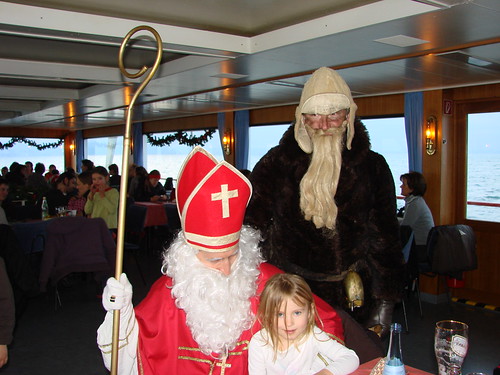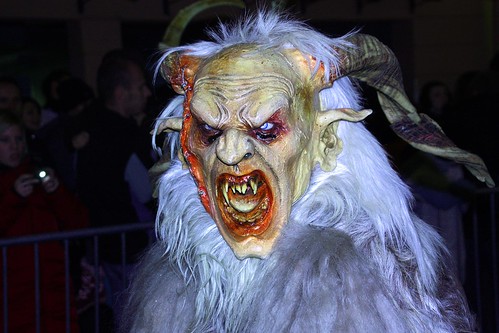The German Boogieman Posted by Constanze on Dec 7, 2016 in Culture
Guten Tag! Today, inspired by a kids’ song I was reminded of recently, the theme is German mythological monsters! The kids’ song is called Es Tanzt Ein Bi-Ba Butzemann. I know this song from my childhood, as many German children probably will.
The song is about a Butzemann dancing around in somebody’s house. The first few lyrics are as follows:
Es tanzt ein Bi-Ba-Butzemann in unser‘m Haus herum, fidebum,
A Bi-Ba-Butzemann is dancing around in our house, fidebum (fi-de-bum is just a filler, like ‚lalala‘)
Es tanzt ein Bi-Ba-Butzemann in unser‘m Haus herum,
A Bi-Ba-Butzemann is dancing around in our house
Er rüttelt sich, er schüttelt sich, er wirft sein Säckchen hinter sich,
He jolts about, he shakes about, he throws his sack over his shoulder,
Es tanzt ein Bi-Ba-Butzemann in unser‘m Haus herum.
A Bi-Ba-Butzemann is dancing around in our house
The next few verses talk about the Butzemann bringing apples to well-behaved children during the night.
So what is a Butzemann, exactly? This is the German word for boogieman (or bogeyman, depending on where you’re from). In fact, the word Butzemann can refer to any kind of Dämon (demon), Gespenst (ghost/spirit), Kobold (goblin) etc.
I know what you are thinking. Why on Earth would you write a Kinderlied (kids’ song) about a boogieman coming into someone’s house during the night? Wouldn’t that just terrify children? Well, yes. But that’s kind of the point.
Many traditional German kids’ stories feature a monster, ghoul or otherwise scary character to scare children into behaving themselves. If you don’t behave, the stories say, this is who you’ll see! The boogieman creature is prominent in many countries across the world, and often carries a sack to steal naughty children with. So there is the suggestion that the Butzemann in Es Tanzt Ein Bi-Ba-Butzemann will bring apples to good children, and take naughty children away with him in his sack!
But the Butzemann isn’t a one-off; characters like this are quite popular in Germany and Austria, as well as other European countries. There is the Nachtkrapp (‘night raven’), a German mthological bird that leaves its nest during the night to steal children from their beds; if a child sees it (ie. if it’s not asleep), the Nachtkrapp will eat it! The Butzemann is also in good company during Christmas time, when the malevolent characters Knecht Ruprecht (N. Germany) and Krampus (S. Germany/Austria) come out to join Father Christmas. You can read about Krampus here!

Knecht Ruprecht with der Weihnachtsmann. Photo by wm_archiv on flickr.com under a CC license (CC BY 2.0)
Do you know of any more German mythological creatures or monsters? Do you have any like this in your own country or culture? Leave me a comment and let us all know!
I’ll leave you with the tune to Es Tanzt Ein Bi-Ba-Butzemann.
Bis bald!
Constanze x

Build vocabulary, practice pronunciation, and more with Transparent Language Online. Available anytime, anywhere, on any device.
About the Author: Constanze
Servus! I'm Constanze and I live in the UK. I'm half English and half German, and have been writing about German language and culture on this blog since 2014. I am also a fitness instructor & personal trainer.






Comments:
Rafael gerardo Magaña Santos MD:
Es ist immer wichtig, einen neues Ausprache zu lernen dabei Ich mage Deutsch viel, und weiter mehr zu lernen.
Ich empage Sie, Deutsch reden zu ampfangen, sofort wenn moglich.
Rafael gerardo Magaña Santos MD:
Hi there. I have a good notion of german since it was spoken at home within my family.
However i find it so fascinating, that it becomes useful when you trave abroad, to Switzeland, Austria, and sometimes, Hungary.
It the language of busines in Germny afterEnglish.
alcazar:
Since you/your family is from Bayern you should also know the Wolpertinger 😛
Here in Thuringia (also in Saxony) we have the Rasselbock (a hare with the antler of a deer 🙂
Constanze:
@alcazar Oh yes! Of course! In fact, I have been meaning to write about him for some time! I’ll look up the Rasselbock. 😀 Thanks for the comment!